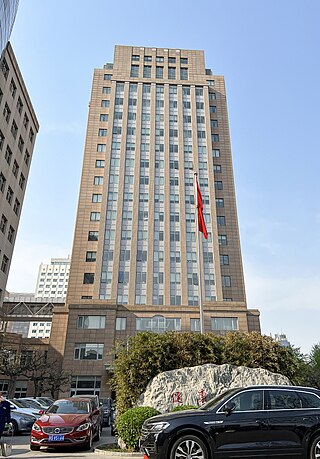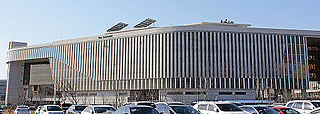
The State Council of the People's Republic of China, also known as the Central People's Government, is the executive organ of the highest organ of state power and the highest administrative organ of the country. It is composed of the Premier, Vice Premiers, State Councilors, ministers of ministries, directors of committees, the Auditor General, and the Secretary-General. The Premier is responsible for the State Council.

The one-child policy was a population planning initiative in China implemented between 1979 and 2015 to curb the country's population growth by restricting many families to a single child. The program had wide-ranging social, cultural, economic, and demographic effects, although the contribution of one-child restrictions to the broader program has been the subject of controversy. Its efficacy in reducing birth rates and defensibility from a human rights perspective have been subjects of controversy.
In China, the practice of medicine is a mixture of government, charitable, and private institutions, while many people rely on traditional medicine. Until reforms in the late twentieth and early twenty-first century, physicians were quasi-government employees and with little freedom in the choice of the hospital to work with. In addition, decades of planned economic policy discouraged physicians from opening their own clinics, and the practice of medicine was generally under the control of local units, such as factories, government, offices, or communes. The reforms created a largely private practice, and physicians now are encouraged to open private clinics and for-profit hospitals.

The Ministry of Health of the People's Republic of China (MOH) was a cabinet-level executive department which plays the role of providing information, raising health awareness and education, ensuring the accessibility of health services, and monitoring the quality of health services provided to citizens and visitors in the mainland of the People's Republic of China. In the reforms of 2013 the ministry has been dissolved and its functions integrated into the now-dissolved agency called the National Health and Family Planning Commission.

The Ministry of Health and Welfare is a branch of the government of South Korea. The headquarters is in Sejong City. Previously the headquarters were on floors 6 through 12 of the Hyundai Building in Jongno District, Seoul, when they were the Ministry for Health, Welfare and Family Affairs.

The National Development and Reform Commission (NDRC) is the third-ranked executive department of the State Council of the People's Republic of China, which functions as a macroeconomic management agency. Established as the State Planning Commission, the NDRC has broad administrative and planning control over the economy of mainland China, and has reputation of being the "mini-state council".

Food safety in China is a widespread concern for the country's agricultural industry. China's principal crops are rice, corn, wheat, soybeans, and cotton in addition to apples and other fruits and vegetables. China's principal livestock products include pork, beef, dairy, and eggs. The Chinese government oversees agricultural production as well as the manufacture of food packaging, containers, chemical additives, drug production, and business regulation. In recent years, the Chinese government attempted to consolidate food safety regulation with the creation of the State Food and Drug Administration of China in 2003; officials have also been under increasing public and international pressure to solve food safety problems. Chinese Vice Premier Li Keqiang said, "Food is essential, and safety should be a top priority. Food safety is closely related to people's lives and health and economic development and social harmony," at a State Council meeting in Beijing.
The National Population and Family Planning Commission, formerly the National Family Planning Commission, was a cabinet-level executive department under the State Council, responsible for population and family planning policy in the People's Republic of China. The commission was dissolved and superseded by the National Health and Family Planning Commission in March 2013, during the first session of the 12th National People's Congress.

The Ministry of Industry and Information Technology is the sixth-ranked executive department of the State Council of the People's Republic of China. It is responsible for regulation and development of the postal service, Internet, wireless, broadcasting, communications, production of electronic and information goods, software industry and the promotion of the national knowledge economy.

The Ministry of Human Resources and Social Security of People's Republic of China is a ministry under the State Council of China which is responsible for national labor policies, standards, regulations and managing the national social security. This includes labor force management, labor relationship readjustment, social insurance management and legal construction of labor. The State Bureau of Civil Servants reports to the new ministry.

The Ministry of National Health Services, Regulation and Coordination is a cabinet level ministry of the government of Pakistan with responsibility for national public health.

The State Oceanic Administration was an administrative agency subordinate to the Ministry of Land and Resources, responsible for the supervision and management of sea area in the People's Republic of China and coastal environmental protection, protecting national maritime rights and organizing scientific and technical research of its territorial waters. In March 2018, the 13th National People's Congress announced that the newly formed Ministry of Natural Resources will replace the functions of the Ministry of Land & Resources, State Oceanic Administration and the State Bureau of Surveying and Mapping.
A two-child policy is a government-imposed limit of two children allowed per family or the payment of government subsidies only to the first two children.
Abortion in China is legal throughout pregnancy and generally accessible nationwide. Abortions are available to most women through China's family planning programme, public hospitals, private hospitals, and clinics nationwide. China was one of the first developing countries to permit abortion when the mother’s health was at risk and make it easily accessible under these circumstances in the 1950s. Following the Chinese Communist Revolution and the proclamation of the People's Republic of China in 1949, the country has periodically switched between more restrictive abortion policies to more liberal abortion policies and reversals. Abortion regulations may vary depending on the rules of the province. In an effort to curb sex-selective abortion, Jiangxi and Guizhou restrict non-medically necessary abortions after 14 weeks of pregnancy, while throughout most of China elective abortions are legal after 14 weeks. Although sex-selective abortions are illegal nationwide, they were previously commonplace, leading to a sex-ratio imbalance in China which still exists.

China's family planning policies have included specific birth quotas as well as harsh enforcements of such quotas. Together, these elements constitute the population planning program of the People's Republic of China. China's program should not be confused with the family planning programs instituted in other countries, which were designed to encourage parents to have the number of children they desired—in China, the provision of contraception through family planning programs was subservient to a birth planning program under which the government designated how many births parents could have in order to control the size of its population.
Shidu is a phenomenon denoting the loss of a parent's only child. The parents who have lost their only child are known as shidu fumu, or simply as shidu parents or shiduers.

Healthcare in Azerbaijan is provided by public and private healthcare institutions and regulated through the Ministry of Healthcare.

The National Health Commission (NHC) is a cabinet-level executive department of the State Council of the People's Republic of China which is responsible for formulating national health policies. It was formed on 19 March 2018. The ministry is headquartered in Beijing. The commission is led by a Minister of cabinet rank in the state council. Ma Xiaowei is the current Minister in charge of the Commission and Party Branch Secretary. Its predecessor was the National Health and Family Planning Commission.

The National Administration of Disease Control and Prevention is a vice-ministerial agency under the National Health Commission of the People's Republic of China. On May 13, 2021, the National Administration was officially listed at No. 14, Zhichun Road, Haidian District, Beijing.















